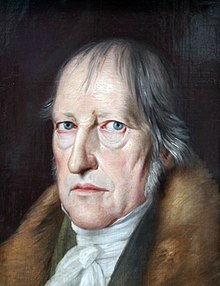 Global Information
Global InformationGeorg Wilhelm Friedrich Hegel information
Georg Wilhelm Friedrich Hegel | |
|---|---|
 1831 portrait | |
| Born | 27 August 1770 Stuttgart, Duchy of Württemberg, Holy Roman Empire |
| Died | 14 November 1831 (aged 61) Berlin, Kingdom of Prussia |
| Education |
|
| Notable work |
|
| Spouse |
Marie Helena Susanna von Tucher
(m. 1811) |
| Children | 3, including Karl and Immanuel |
| Era | 19th-century philosophy |
| Region | Western philosophy |
| School |
|
| Institutions |
|
| Thesis | Dissertatio Philosophica de Orbitis Planetarium (Philosophical Dissertation on the Orbits of the Planets) (1801) |
| Academic advisors | J. F. LeBret (M.A. advisor) |
Main interests |
|
| Signature | |
Georg Wilhelm Friedrich Hegel[a] (27 August 1770 – 14 November 1831) was a German philosopher and one of the most influential figures of German idealism and 19th-century philosophy. His influence extends across the entire range of contemporary philosophical topics, from metaphysical issues in epistemology and ontology, to political philosophy, the philosophy of history, philosophy of art, philosophy of religion, and the history of philosophy.
Born in 1770 in Stuttgart, Holy Roman Empire, during the transitional period between the Enlightenment and the Romantic movement in the Germanic regions of Europe, Hegel lived through and was influenced by the French Revolution and the Napoleonic wars. His fame rests chiefly upon The Phenomenology of Spirit, The Science of Logic, his teleological account of history, and his lectures at the University of Berlin on topics from his Encyclopedia of the Philosophical Sciences.
Throughout his work, Hegel strove to address and correct the problematic dualisms of modern philosophy, Kantian and otherwise, typically by drawing upon the resources of ancient philosophy, particularly Aristotle. Hegel everywhere insists that reason and freedom are historical achievements, not natural givens. His dialectical-speculative procedure is grounded in the principle of immanence, that is, in assessing claims always according to their own internal criteria. Taking skepticism seriously, he contends that people cannot presume any truths that have not passed the test of experience; even the a priori categories of the Logic must attain their "verification" in the natural world and the historical accomplishments of humankind.
Guided by the Delphic imperative to "know thyself", Hegel presents free self-determination as the essence of humankind – a conclusion from his 1806–07 Phenomenology that he claims is further verified by the systematic account of the interdependence of logic, nature, and spirit in his later Encyclopedia. He asserts that the Logic at once preserves and overcomes the dualisms of the material and the mental – that is, it accounts for both the continuity and difference marking the domains of nature and culture – as a metaphysically necessary and coherent "identity of identity and non-identity".
- ^ Cite error: The named reference
rhwudwas invoked but never defined (see the help page). - ^ a b Cite error: The named reference
LPDwas invoked but never defined (see the help page). - ^ Cite error: The named reference
de-duden-pronwas invoked but never defined (see the help page).
Cite error: There are <ref group=lower-alpha> tags or {{efn}} templates on this page, but the references will not show without a {{reflist|group=lower-alpha}} template or {{notelist}} template (see the help page).